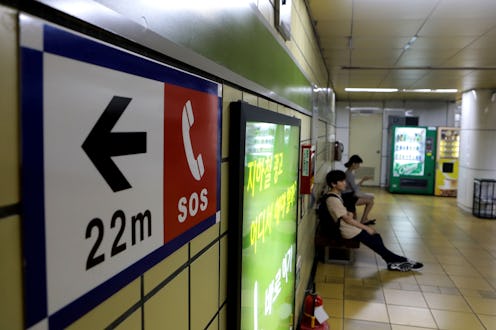News
What If Your Phone Could Diagnose Mental Illness?
Ever felt like you're exposing more than you'd like online? You might be right. New apps are using social media and smartphone calls to pick up on signs of mental illness, from depression to bipolar disorder — and they are already raising worries about false diagnoses and users' right to privacy.
One smartphone app, currently being tested at the University of Michigan, attempts to detect mood changes in people with bipolar disorder by monitoring their phone calls. It's not as 1984 as it sounds, though: the app is elective, and uses voice analysis to track the speaker's state of mind.
Your voice and patterns of speech, it turns out, can tell a lot about your mood. (Think about the last time you tried to have a conversation with your mother when you were miserable as hell.) That could be particularly valuable for people with bipolar disorder, who are at the mercy of huge emotional highs and lows. Knowing which one is coming in advance could make a massive difference for managing symptoms and wellbeing.
And that's the point of the smartphone app: to construct an early warning system. The app's developers say that ultimately, they hope to be able to detect an upcoming mood swing as it starts to show up in phone calls, and notify the user and their doctor.
"Our aim is to be able to anticipate swings, so that it may be possible to intervene early," the co-author of the study, Zahi Karam, said.
Of course, your Facebook habits could also be revealing of more than your inability to unfriend that one girl who's always posts about Nickelback. Some researchers posit that Facebook could also reveal whether you suffer from depression.
Researchers at Cambridge came up with an app, myPersonality, which asks users to give them access to certain Facebook activity, and also to fill out a quiz about their state of mind.
The results? Not exactly surprising: if you post pissed-off, sad, or miserable Facebook updates regularly (and use those words a lot), you're more likely to be suffering from depression in real life.
"I think we’re at the point where it could at least be a useful tool to consider, but it’s not at a point where it could be relied on to diagnose depression," developer Andy Schwartz says. "For those social media users that are very active and quite open, I think within a few years we could have models that are nearly as accurate as psychiatric experts."
It's also no use to potential depressives who aren't on Facebook, or those who don't talk about their feelings online, even inadvertently. (Or those people who quote a lot of depressed French authors to look seductively angst-ridden.)
So are apps actually going to catch on when it comes to diagnosing mental health problems? Well, there's already a wealth of apps available to help cope with disorders — including one specifically for veterans; one with a GPS that alerts alcoholics if they're coming too close to a bar; and a game (described as a far less exciting Flappy Bird) that reportedly calms anxiety.
But effectively diagnosing and close-monitoring disorders through smartphones may be a way off. For one, online privacy's a bit of a problem. Even though the makers of the bipolar app insist that their way of monitoring phone calls doesn't infringe on anybody's privacy, they still need to store some information about the caller's identity.
Not to mention, the idea of a monitoring tool for mental disorders coming on the market has made more than a few people uneasy.
"Who says that Facebook isn't going to sell that tool to other companies, drug companies that want to target you?" Deborah Peel, founder of Patient Privacy Rights, says. "The problem is the risks are great, and there are no ways for any of us to protect ourselves from the use of our data online."
If potential employers, or your parents-in-law, have the capacity to go through all your statuses searching for 'red flags,' Facebook could become even more of a minefield.
Of course, smartphone app privacy is a notoriously tricky subject. It suddenly came into the spotlight last year when it was revealed that a flashlight app was selling user info, including their GPS location, to third parties — even after supposedly allowing users to opt out. And even if an app wants to keep things private, its data could still be vulnerable to hackers.
The other problem? Accurate diagnosis. Mental health problems still carry societal stigma, and the idea of trusting such an important diagnosis to data collected by a smartphone, rather than confidential consultation with a professional, might be a risk most of us are unwilling to take.
